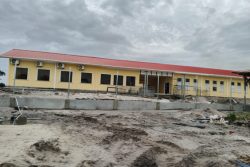Dear Editor,
The National Insurance Scheme was established in Guyana by the relevant Act in 1969. It remains such a creative piece of legislation that one does not recall any subsequent administration substantively upgrading it, particularly in the face of the incidence of the appreciable number of non-compliant employers.
Not totally irrelevant, one recalls its Chairman, Dr. Roger Luncheon, years ago appointing quite a large representative team to review the management and operationalities of the Scheme and to make recommendations for general and specific improvements.
During the process, arrangements were made for an attachment to NIS Barbados, to observe what administrative practices could be usefully adapted in Guyana. One outstanding feature which would have addressed the substantive membership contribution gap which still obtains in Guyana, was the provision by the Barbados Management of technological accommodation for not only actual, but also expectant employees, to register their personal particulars, ahead of the employer. As appropriate, the Scheme’s management would then relate to the relevant employer, who would have little choice but to confirm the information recorded at the time of employment. The Barbados management boasted about eighty (80) percent success rate of this intervention and in the collection of employer/employee contributions.
Needless to say, the initiative has never been explored in Guyana, where too high a percentage of private sector employees, and indeed some public sector-type colleagues, are resigned to non-membership of our National Insurance Scheme. Female employees are usually the bulk of the sufferers.
Not many of the following institutions involved would recall an internationally funded project some years ago that was intended to fast track the registration of new employers, particularly from overseas. It was a time of the introduction of technology aimed at connecting i) GO-INVEST, ii) Guyana Revenue Authority, iii) Deeds Registry and iv) NIS, with the effect of the last named agency being alerted to implications for necessary new contributors. The undersigned was directly involved in the above exercises. It is for reflection as to what extent the findings provided have been beneficially utilised, if at all – that is since 2004.
There is no indication as to whether the NIS had ever been alerted to these initiatives. With the current and anticipated future flow of new (local and foreign) employers, the relevant authorities can do no worse than revive these thoughtful trails with a view to giving the Management of NIS the financial support so much needed.
Incidentally our Barbados counterpart had a Legal Section of five highly motivated Attorneys-at-Law (whom I met). Just compare the respective populations with which the respective schemes must interact.
Yours faithfully,
E.B. John







